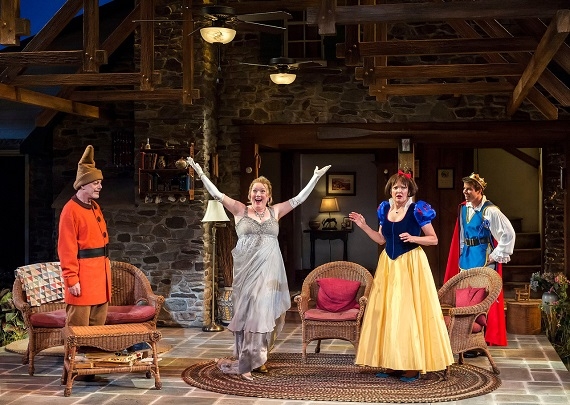Vanya and Sonia and Masha and Spike

(© Craig Schwartz)
Despite the title, Vanya and Sonia and Masha and Spike is not a revival of a lost Anton Chekhov play, but a refashioning of Chekhovian themes in a modern setting. Acclaimed parodist Christopher Durang has written a hysterical comedy of family most foul that has been seamlessly transferred to the Mark Taper Forum, with apt direction by David Hyde Pierce, who played Vanya in the Broadway production.
Original Broadway cast member and Tony nominee Kristine Nielsen joins Christine Ebersole and Mark Blum as siblings arguing over their family estate. The insincere and insecure celebrity Masha (played by Ebersole) has returned home to kick her brother, Vanya (Blum), and adopted sister, Sonia (Nielsen), out of the family home. In tow is Masha’s 29-year-old boy toy, Spike (David Hull), a wannabe actor whose claim to fame is that he almost got a role in the sequel to the HBO’s series Entourage.
Blum is quietly noble as the level-headed brother who once chose caring for his ailing parents over his personal ambitions, while his sister Masha had abandoned everyone to star in a slew of successful schlock films. The script rewards Blum with a tour-de-force monologue about deteriorating society that is memorably explosive. Ebersole is hilariously shrill as the self-involved actress. As the adopted sister who feels more like an indentured servant, Kristine Nielsen is a lovable collection of neuroses and insecurities. Nielsen shines in a long phone conversation with a potential suitor, as her character metamorphoses from a wallflower to a confident woman. Shalita Grant evokes a young Whoopi Goldberg with her brassy characterization of the clairvoyant housekeeper, Cassandra. Her convulsions when she has a psychic vision are hysterical. Liesel Allen Yeager, as innocent neighbor Nina, has an angelic presence. Hull appears to enjoy himself as the Adonis everyone worships. With a game-show-host smile and a lack of integrity or intelligence, Hull's Spike is the epitome of how elders imagine the shallow younger generation.
Christopher Durang has written a treat for Chekhov fans, tying character prototypes from the classic works of Uncle Vanya, Three Sisters, and The Seagull, but he has also built a solid comedy that’s accessible for any audience member regardless of Chekhov-scholar status. One could walk into the Mark Taper Forum with no idea who Chekhov was and still love every minute of this priceless family comedy, which draws not only on Russian literature, but on Neil Simon films and the legacy of Snow White.
David Korins’ set puts the audience in the morning room of a bucolic Pennsylvania country home. The details, from figurines on the mantel to the old worn board games under the wicker coffee table, enhance the experience.
Gabriel Berry’s costumes are a visual feast, informing the characters as much as the dialogue, from Vanya and Sonia’s ratty sleeping clothes that look like they’ve been worn nonstop to Spike’s tight red jeans and skimpy underwear. And, when decked out for the neighbor’s party, the Snow White, Prince Charming, and Dwarf costumes border on parody themselves.
Vanya and Sonia and Masha and Spike captures a society in decline with realizations on everything from global warming to global technology, but they find hope and strength in their family, even if they hate one another once and again.











